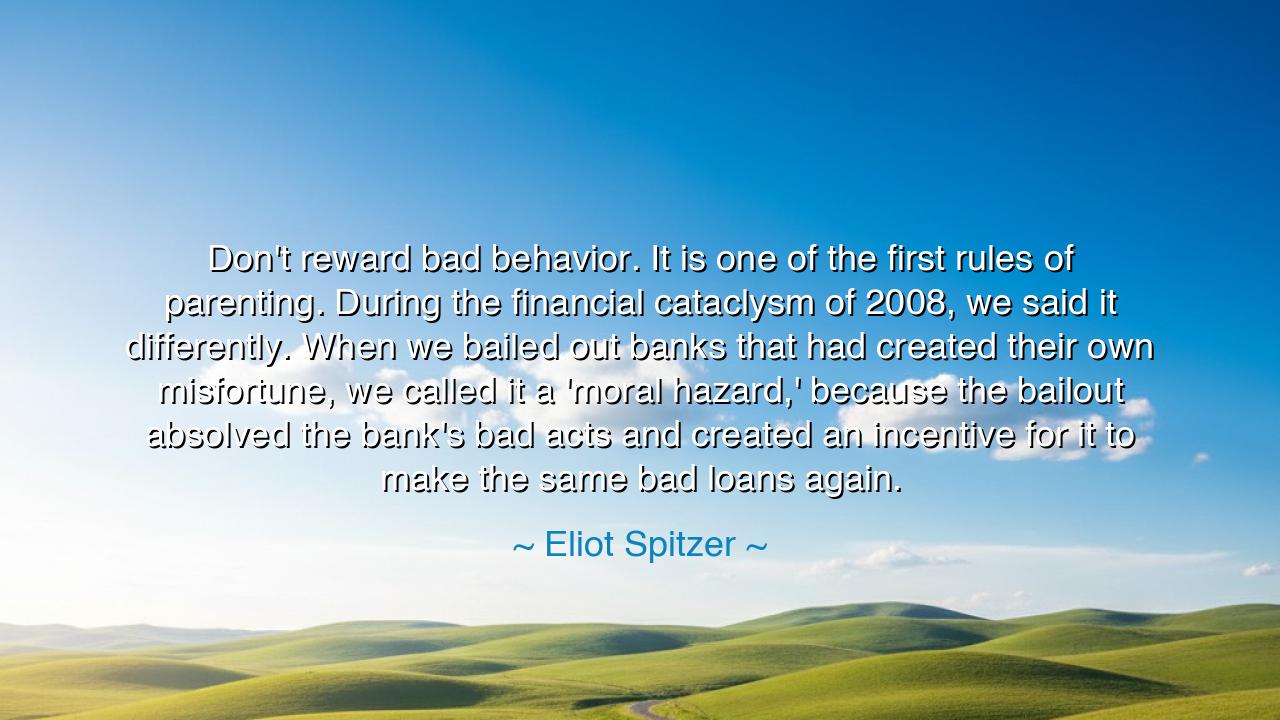
Don't reward bad behavior. It is one of the first rules of
Don't reward bad behavior. It is one of the first rules of parenting. During the financial cataclysm of 2008, we said it differently. When we bailed out banks that had created their own misfortune, we called it a 'moral hazard,' because the bailout absolved the bank's bad acts and created an incentive for it to make the same bad loans again.






The words of Eliot Spitzer—“Don’t reward bad behavior. It is one of the first rules of parenting. During the financial cataclysm of 2008, we said it differently. When we bailed out banks that had created their own misfortune, we called it a ‘moral hazard,’ because the bailout absolved the bank's bad acts and created an incentive for it to make the same bad loans again.”—speak with both the clarity of a parent and the severity of a judge. He draws upon the timeless wisdom of the household to illuminate the folly of nations: the principle that when misdeeds are indulged, when error is shielded from consequence, corruption grows stronger, not weaker.
The ancients knew this truth well. In the house of every family, the first law is simple: reward virtue, discipline vice. If a child strikes his sibling and is then given sweetmeats to calm his cries, he will strike again tomorrow, knowing no punishment will follow. The same truth holds in the realm of kings and nations. When the mighty err and are not held accountable, their misdeeds are repeated with greater boldness. Spitzer calls this a moral hazard: when the wrongdoer is absolved of pain, the wrong becomes a cycle that destroys families, societies, and empires alike.
History offers countless examples. Consider the fall of Rome. For generations, corruption in the Senate was tolerated and indulgence was rewarded. Leaders enriched themselves, soldiers sold their loyalty, and the treasury was plundered without consequence. Each indulgence was a bailout, a refusal to punish misdeeds, until the empire itself collapsed under the weight of its own decay. The lesson is the same: to reward bad behavior is to poison the well from which all must drink.
Spitzer’s connection to parenting is more than metaphor. The family is the training ground of virtue, where justice is first taught. If parents allow dishonesty to flourish, if they indulge cruelty, they raise not strong children but tyrants in miniature. So too, nations that excuse corruption in their institutions raise generations of leaders who believe power is shield from consequence. Thus, the household and the empire are mirrors of one another, both standing or falling upon the same law: justice must walk hand in hand with mercy, but mercy must not become indulgence.
The meaning, then, is that discipline is love, and accountability is mercy. To allow a child or an institution to continue in wrongdoing without consequence is not kindness but cruelty in disguise, for it teaches them nothing of wisdom. True parenting, and true governance, require the courage to say no, the strength to let consequences be felt, and the patience to guide others back toward righteousness. Without this, both the child and the nation remain trapped in cycles of error.
The lesson for us is clear: do not confuse compassion with indulgence. In the home, hold children accountable with fairness, so that they may learn responsibility. In the realm of society, demand that leaders, companies, and institutions face the weight of their own choices. To shield them from consequence may seem merciful in the moment, but it only ensures greater suffering for all in the future.
Therefore, let your actions be these: teach accountability early. Resist the temptation to soften every consequence. Stand firm against corruption, whether in your household, your workplace, or your nation. And above all, remember that justice, though stern, is a form of love—for it teaches the soul to grow upright and prepares the world to endure.
Thus, Eliot Spitzer’s words endure as a timeless principle: whether in the nursery or in the halls of power, rewarding bad behavior breeds destruction. The family and the state alike must learn this law, lest indulgence become decay. Let future generations remember: strength lies not in shielding others from the fruit of their deeds, but in guiding them to bear it, so that wisdom may grow and the future may be secured.






AAdministratorAdministrator
Welcome, honored guests. Please leave a comment, we will respond soon